Equity 101 Glossary
Bookmark or download this page so you have it ready for job offers, questions for your employer, tax time, and whenever questions come up.

First things first
Equity: an ownership interest in a company, as with shares of stock. In Equity 101, we talk about equity in privately held companies.
Equity compensation: a way for your employer to reward you with partial ownership in their company—and for you to share in the success of the company as it grows.
Equity helps you own your future. When you understand the basics of equity, you’ll be able to ask informed questions and make confident decisions about building your wealth.
Types of stock
Incentive stock options (ISOs): A type of stock option that’s typically taxed only when you sell your shares.
With ISOs, you’re likely to be off the hook for taxes when you exercise, but you’ll still need to pay them when you sell the resulting shares. But that’s not always the case, and it’s always a good idea to consult a tax advisor before you lock in a plan to exercise your options.
Non-qualifying stock options (NSOs): Another type of stock option. If you have NSOs, you’ll typically pay taxes both when you exercise them and when you sell the resulting shares.
If your equity grant says you have NSOs, you will definitely want to make a plan so that you’re prepared to pay both the exercise price and the tax.
Restricted stock units (RSUs): This is a type of equity grant where you own shares automatically if certain conditions—like vesting—are met. RSUs are more likely to be issued by more mature companies.
You don’t need to plan to exercise your RSUs; they’re yours outright once they vest. But when they do vest, you’ll need to pay taxes.
Stock options: A type of equity compensation that gives you the option to buy shares at the price listed on your equity grant. Early-stage companies tend to give stock options.
Stock options aren’t stock. That’s a big misconception. You still need to buy (“exercise”) them at the agreed-upon price (“strike price”) in order to be an owner.

Navigating your equity grant
Cliff: The date when the first part of your equity grant vests and you’ve earned your shares or the right to buy stock options.
Many companies have a one-year cliff, meaning you’ll earn your first set of shares after a year. And if you leave before the cliff, you won’t vest any shares. (That’s how they motivate you to stick around.)
Common stock: Just like you’d think from the title, it’s the most common and simplest form of stock. This is the type of stock that’s typically issued to employees and founders.
Shareholders of common stock are typically paid after holders of preferred stock in liquidity events like a M&A transaction—and sometimes not at all, depending on the deal.
Employee stock option pool: A portion of shares in a company that is set aside for employees as equity compensation.
This pool of shares is where your equity compensation comes from.
Equity grant: A record that you receive when your employer grants you equity as part of your compensation. It tells you how many shares you’ll get, the amount of money each share is worth, and how your shares will be made available to you.
Your equity grant contains a lot of important information. Make sure you refer to it before making any decisions.
Exercising: The act of purchasing stock from your company.
If you were issued stock options, you don’t own shares until you actually exercise them. That’s important to know so you can plan to pay for them, and to pay any applicable taxes.
Fair market value (FMV): The FMV is the agreed-upon value of what one share of common stock is worth as of a specific date. It’s typically determined by a 409A valuation (see below).
The FMV is how you know how much your shares are worth in the eyes of the IRS.
Post-termination exercise period (PTEP): A set period of time your company gives you to exercise your vested options after you leave. Often, this window is 90 days.
If you don’t exercise before this window closes, they expire. It can be hard to exercise your options within that (often-short) period of time without planning ahead.
Strike price: What it will cost to exercise your stock options, as specified on your equity grant. This is also known as an “exercise price.”
If you are issued more than one grant, each one could have a different strike price. Make sure you’re paying attention to the strike price and fair market value in each grant.
Trigger: An event after which you actually begin to receive your shares.
Typically, options vest on what’s called a “single trigger”—there’s only one thing (like hitting a date) that has to happen in order for them to vest. RSUs often vest on a “double trigger.” Besides time, something else needs to happen, like a milestone, acquisition, or IPO.
Vesting: Earning the right to actually own your equity. Companies use vesting to entice you to stay longer or reward you for performing well. Time-based vesting (earning more of your options or shares the longer you stay with your company) is typical. Event-based vesting is tied to an event like a work goal or a company milestone.
Your equity grant will likely contain the timeline by which your shares will be made available to you—your “vesting schedule.” You need to know the schedule to understand when to make money moves, like exercising your options, participating in a liquidity event or paying taxes.

Equity and taxes
83(b) election: A tax form that you file if you choose to exercise your options early.
If you’re permitted to exercise early and you decide to do it, you need to work with your company to file an 83(b) election with the IRS and make sure to follow all their rules.
Alternative minimum tax (AMT): The minimum amount a taxpayer must pay to the IRS. When you do your taxes, you calculate your ordinary income and your AMT—and you have to pay whichever one yields a bigger tax obligation.
The AMT is important when you think about exercising your options. If your company has grown, you may be liable for taxes on the “spread” between what your options were worth at the time they were issued and at the time you exercise—even though you haven’t sold them yet. Companies don’t withhold this tax on your behalf, so you’re solely responsible for it.
Capital gains tax: Taxes on the profit you make from an investment. If you have a qualifying disposition (see below), long-term capital gains are taxed at a preferential rate that can be anywhere between zero and 20%.
If you sell shares that don’t have a qualifying disposition, they will be subject to short-term capital gains, which are taxed at ordinary income rates.
Early exercise: A way companies can allow employees to exercise options before they actually vest. Not every company offers this. If it’s available (and you decide you want to do it) you’ll need to work with your company to file an 83(b) election with the IRS.
Early exercise can potentially save you a lot of money on taxes, but it is risky, since if your company goes out of business, you may not be able to recoup those losses.
Qualifying disposition: Shares that meet the holding requirements to receive preferential tax treatment from the IRS.
To have a qualifying disposition, you need to hold onto your shares (and not sell them) for at least a year after you exercise them and two years after the option grant date.

Selling your shares
Liquidity: Liquidity is the ability to sell your shares for cash. While public company shares are bought and sold fairly easily on the stock market, opportunities to sell your private company shares are more limited.
You won’t be able to get liquidity in a privately held company unless your company decides to IPO, joins with another company in an M&A, or offers a liquidity event (like a tender offer) to its employees.
Initial public offering (IPO): When your company “goes public,” meaning that its stock is listed on a public exchange.
When your company IPOs, you usually have a lock-up period where you can’t sell your shares right away. Then, you can decide to sell or to hold your shares.
Merger/acquisition (M&A): When your company gets bought by another entity, or merges with another company.
Mergers and acquisitions can be liquidity events. Often, the acquiring company will give you a lump sum payout. If you own common stock (like most employees and founders do), you’ll be the last to be paid out.
Tender offer: A tender offer is an event where your own company or a third party offers to buy shares back from you to allow you to get liquidity.
Tender offers are usually one-offs, and not all companies offer them. Ask your employer (or potential employer) whether they have a liquidity plan for their employees.

Private companies, equity, and fundraising
409A valuation: An assessment of the fair market value of a private company’s common stock. A 409A must be performed by a qualified, independent valuation provider.
This type of valuation is how companies know what the price of one share of common stock will be. If you’re an employee, you’re most likely to have been granted common stock, so you should keep an eye on the FMV. A 409A valuation should be done at least every 12 months, or whenever the company has a material event (like a fundraise).
Cap table (aka “capitalization table”): A record of who has equity in a company, how many shares they hold, what type of equity they have, and how they will eventually get paid out.
A disorganized cap table can spell trouble for a company—and its employees.
Convertible instrument: A way private companies raise money from investors. The investor gives the company a sum of cash. In exchange, the company will either pay the investor back with interest or convert that money into shares later on. The two most common types of convertible instruments are convertible notes and SAFEs.
An investor takes more risk and has less control over the company in those earlier stages, but may receive a friendlier amount of equity from the company later on, sort of as a “thank you” for being patient.
Convertible note: A convertible note is a type of convertible instrument that some early-stage startups use to raise funds. It is a form of debt that can convert into shares in the company upon an agreed-upon event in the future.
A convertible note has a maturity date—if the event doesn’t occur by that date, the company either has to pay the investor back in cash (with interest) or renegotiate to extend the note.
Pre-money valuation: A calculation of the amount of money the company is worth before an investment comes in.
Investors often require an employee stock option pool to be created on a pre-money basis, meaning that the pool will only affect the people who owned shares before the investment came in.
Priced round: A way private companies can raise funds from investors by taking money in exchange for shares in the company. In these agreements, the investor pays a clear, defined price for a certain percentage (or number of shares).
Priced rounds are typically used by VC firms once a company gets some traction and really starts growing. Those rounds tend to be “lettered,” like Series A, B, and C.
Post-money valuation: A calculation of the amount of money the company will be worth after an investment comes in. It’s based on the price of preferred shares, which are granted to investors.
This type of valuation is a way for founders to keep track of the equity they control in a company.
SAFE (aka the Simple Agreement for Future Equity): SAFEs are a way startups raise money from investors, especially in the early stages. A SAFE is an agreement that states an investor will give a company money now, and the agreement will convert into equity later on—typically during the company’s next priced round.
SAFEs really live up to their name: The paperwork is usually much simpler than any other type of fundraising.
Valuation: A way to determine the fair market value of your company’s common stock.
Valuators look at things like growth rate, number of users, the company’s industry…and sometimes, even the experience level of the founding team.

Investing in startups
Accredited investor: One of two types of investors permitted to invest in startups by the SEC. To become accredited, an investor must meet a specific income or net worth threshold, or pass a financial exam and hold a specific license.
The accredited investor qualification is a common way for individual people to start investing in startups. As of today, the criteria are either 1) an income of $200,000 a year single or $300,000 joint in each of the two most recent years; 2) a net worth of over $1 million not counting the value of your primary residence, or 3) taking the test to receive a license Series 7, Series 65, or Series 82. But these requirements may change. At Carta, we believe that more people should be able to become accredited investors.
Angel investor: An individual person with enough capital to invest in startups who invests directly into the company, rather than putting money into a fund.
Angel investors often invest in the early stages of a company, usually via convertible instruments. That means angel investors typically take on more risk.
Carried interest: When a fund makes money, the general partner of a VC firm has to pay back all her LPs for their original investment. Then, the general partner gets to keep a percentage of whatever money the fund makes on top of that. Often, carried interest (aka “the carry”) is 20%.
The carry is essentially a GP’s “cut” of the overall profits from the fund.
Fund: A legal structure that pools other people’s money together to invest.
Typically, VC firms are structured into three parts: The general partner, the management company, and the fund.
General partner (GP): In a VC firm, the GP is the manager that controls a fund.
GPs are the venture capitalists who decide which private companies to invest in and manage the investments.
Limited partner (LP): Institutional investors who invest in venture capital funds through a VC firm.
LPs bring the money to invest, but typically aren’t involved in the day-to-day—though they will have requirements.
Management company: A company that is part of a VC firm. Everything that makes the firm run, like hiring and paying employees and finding office space and software, is done and paid for by the management company.
You can think of the management company like the “brand” of the firm, and the “headquarters’” of the firm.
Management fee: A fee on a fund charged by the management company so it can handle overhead. Usually, the fee is around 2% of the value of a fund.
Along with carried interest, this is the other way a VC firm makes money. GPs often refer to their overall pay structure with the phrase “two and 20,” or 2% management fee with a 20% carry.
Preferred stock: A type of stock that is mainly issued to investors, who usually pay a higher price per share than for common stock.
Shareholders of preferred stock get paid out first if the company has an exit event (like an IPO or M&A) or in case of bankruptcy.
Qualified purchaser: An entity—which could be an individual or a business—with a significant amount of investment capital. This is the second of two types of investors permitted to invest in startups by the SEC.
Qualified purchasers are permitted to take on more types of investments than accredited investors, but the credentials are stricter. Individuals need to have either $5 million invested for themselves or $25 million in private capital invested on behalf of other people.
The SEC: The Securities and Exchange Commission, a government regulatory agency whose duties include protecting investors.
A private company isn’t required to make financial information public, so investing in a private company comes with more risk. For that reason, not everyone can invest in a startup—only people deemed by the SEC to be sophisticated enough to understand the heightened risk involved.
Special-purpose vehicle (SPV): An SPV is like a VC fund, but it’s designed to only invest in one single thing—often one company.
New investors often use SPVs to build a track record when they’re just starting out. Investors might also use an SPV when they want to do a deal that’s outside the normal operating procedure of their fund.
Term sheet: A legal document that lists the terms and conditions under which an investor will give money to a company.
The term sheet contains a lot of important information and a close read is necessary. One of the most important parts of a term sheet is the company’s valuation.
Venture capital firm (aka “VC firm”): A company that makes startup investments on behalf of pooled funds from institutional investors, called limited partners.
VC firms fund startups, often coming in later than angel investors as the company is a bit more mature. They typically fund companies with priced rounds.
Need more info on your equity grants and how it all works for private companies?
You can access the Equity 101 video course any time.